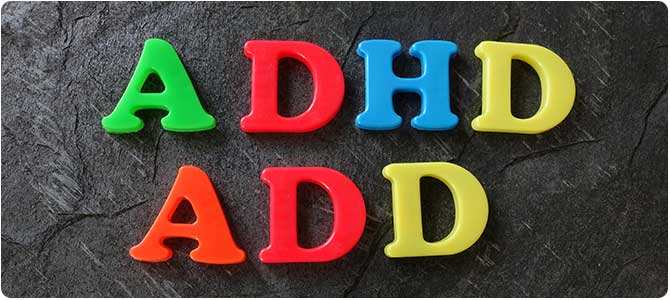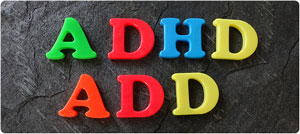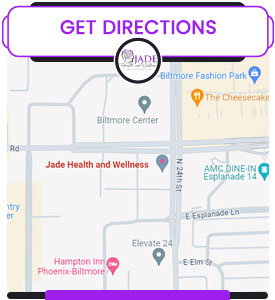ADHD Treatment Specialist in Phoenix, AZ
If you or someone you know is having symptoms of ADHD/ADD, then contact us at Jade Health and Wellness Center. Some common symptoms of ADHD include difficulty focusing, impulsivity, restlessness, and hyperactivity. Consult with Courtney Gaines if your child has ADHD. For more information, contact us today or book an appointment online. We are conveniently located at 2375 East Camelback RD Suite 600 Phoenix, AZ 85016.


Table of Contents:
What is ADHD/ADD?
What causes ADHD?
What are some symptoms of ADHD?
What is the best treatment for ADHD/ADD?
Attention-deficit disorder (ADD) and attention-deficit/hyperactivity disorder (ADHD) are two related but distinct conditions characterized by inattention, impulsivity, and, in ADHD, hyperactivity. While these conditions are often diagnosed in children, they also affect adults; current estimates claim that as many as 10 million adults in the United States are living with ADHD.
ADD stands for attention deficit disorder. ADHD stands for attention-deficit/hyperactivity disorder. The condition is typically diagnosed in adolescents when they begin experiencing difficulties paying attention in school, however, ADHD can be found in adults as well. Some experience hyperactivity, while others struggle with the ability to pay attention, and in most cases, they experience impulsivity and novelty-seeking behavior.
ADHD may be caused by:
● Brain Anatomy & Function — ADHD may be associated with lower levels of activity in the parts of the brain that control activity level and attention.
● Genes & Heredity — Because it can be passed down genetically, ADHD frequently runs in families. There is a 25 percent chance that a child with ADHD will have a parent with ADHD; another close family member, such as a sibling, is also likely to have ADHD.
● Head Trauma — In some cases, significant head injuries may cause ADHD.
● Prematurity — If a child was born prematurely (before the end of the third trimester), they are at an increased risk of developing ADHD.
● Prenatal Exposures — Exposure to alcohol or nicotine in a developing fetus is also linked with an increased risk of developing ADHD.
● Environmental Toxins — In very rare cases, toxins in the environment, such as lead or other heavy metals, can contribute to the development of ADHD.
Symptoms of ADHD include:
● Trouble focusing on tasks
● Getting bored quickly
● Difficulty paying attention
● Frequently making simple mistakes
● Trouble planning ahead
● Often misplacing belongings
● Inability to actively listen
The treatment for ADHD usually involves a multimodal approach that may include:
● Behavioral Therapy: This type of therapy helps individuals with ADHD develop coping strategies, improve organizational skills, and enhance social interactions. It can be particularly beneficial for children and adolescents.
● Medication: Stimulant medications, such as methylphenidate or amphetamine-based drugs, are commonly prescribed to manage ADHD symptoms. Non-stimulant medications like atomoxetine may also be used. Medication helps improve attention, focus, and impulse control in many individuals with ADHD.
● Education and Support: Educating the affected individual and their family members about ADHD is crucial. Learning about the disorder can help manage expectations and foster understanding. Support groups can also be valuable for sharing experiences and finding encouragement.
● Parenting Strategies: Parent training programs can help parents learn effective techniques for managing their child’s behavior and promoting positive interactions.
● School Interventions: Collaboration with teachers and school staff can lead to tailored educational plans, such as individualized education plans (IEPs) or 504 plans, which can accommodate the child’s specific needs.
● Lifestyle Changes: Regular exercise, sufficient sleep, and a balanced diet can contribute to better ADHD management. Reducing distractions in the environment can also be helpful.
● Cognitive-Behavioral Therapy (CBT): For older individuals with ADHD, CBT can assist in addressing the emotional and psychological challenges associated with the disorder.
● It’s necessary to work with a healthcare professional to create a personalized treatment plan. Treatment effectiveness may vary for each individual, and periodic evaluations and adjustments may be necessary to ensure the best outcomes.
If you or your child has ADHD or is exhibiting symptoms related to the condition, come to Jade Health and Wellness Center to find out how we can help. For more information, contact us today or book an appointment online. We are conveniently located at 2375 East Camelback RD Suite 600 Phoenix, AZ 85016. We serve patients from Phoenix AZ, Scottsdale AZ, Paradise Valley AZ, Alhambra AZ, Tempe AZ, and surrounding areas.


Additional Services You May Need
▸ ADHD/ADD
▸ Anxiety Disorders
▸ Bipolar Disorders
▸ Borderline Personality Disorder
▸ Depression Disorders
▸ Eating Disorder
▸ Grief Therapy
▸ Life Coaching
▸ Men’s Mental Health
▸ Mental Health Therapy
▸ Mood Disorders
▸ OCD Disorders
▸ PTSD Disorders
▸ Panic Disorders
▸ Stress Disorders
▸ Talk Therapy
▸ Women’s Mental Health
▸ Social Phobia


